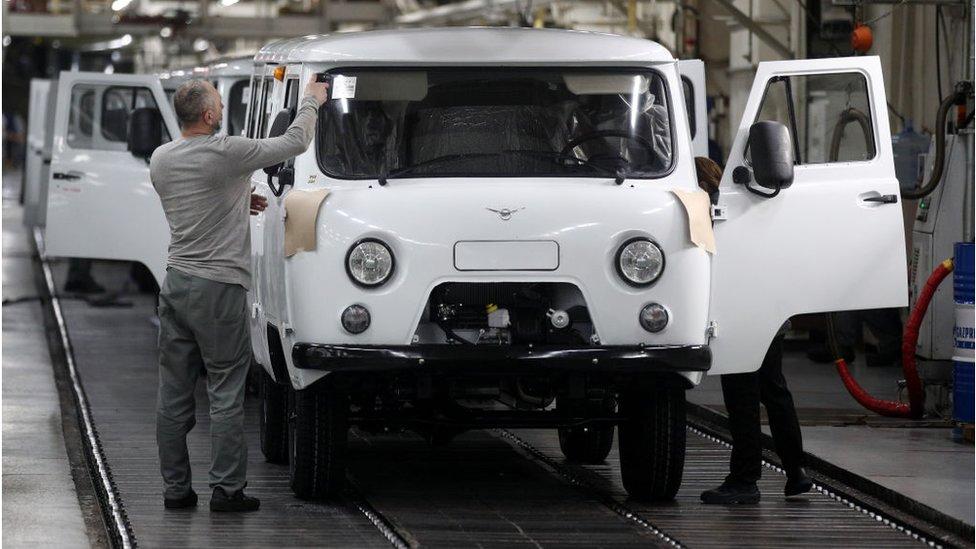
Russia responded to Western sanctions for the invasion of Ukraine by imposing an export ban on a range of products until the end of 2022.
The ban includes exports of telecommunications, medical devices, automobiles, agricultural and electrical, as well as some forest products such as timber.
The Economy Ministry said further measures could include restricting foreign ships from Russian ports.
“These measures are a reasonable response to those imposed on Russia,” she said.
The ministry added that the ban on countries that “committed unfriendly acts” was “aimed at ensuring the uninterrupted functioning of key sectors of the economy.”
The export ban includes more than 200 products. The procedures will continue until the end of the year.
Western governments have imposed a series of sanctions on Russia, particularly in relation to oil purchases, and against billionaire oligarchs who are seen as close to President Vladimir Putin.
About 48 countries will be affected, including the United States and the European Union.
The order said export exemptions could be granted to Georgia’s breakaway regions of South Ossetia and Abkhazia and to members of the Russian-led Eurasian Economic Union.
Russian Prime Minister Mikhail Mishustin said the ban would include exports of goods produced by foreign companies operating in Russia. Items include cars, railroad cars, and containers.
This comes at a time when former Russian President Dmitry Medvedev warned of the possibility of nationalizing the assets of Western companies that withdrew from Russia.
Companies were either leaving en masse or halting investment, including industry and mining giants such as Caterpillar, Rio Tinto, Starbucks, Sony, Unilever and Goldman Sachs.
On Wednesday, Moscow approved a law that took the first step towards nationalizing the assets of foreign companies leaving the country.
In a statement on Thursday, Medvedev said: “The Russian government is already working on measures including bankruptcy and the nationalization of property of foreign organizations.
Foreign companies must understand that returning to our markets will be difficult. He accused foreign investors of creating “panic” for ordinary Russians who could now lose their livelihoods.
According to the latest figures, Russia is the UK’s 19th trading partner, with total trade between the two countries reaching £15.9 billion over the course of a year as of the end of September 2020.

It’s an impressive list, but how much damage will these counter-sanctions actually cause?
The bulk of what Western countries buy from Russia consists of raw materials. Oil and gas of course, but also metals such as aluminum and nickel, not to mention potash and phosphates, which are widely used in fertilizers.
The conflict has already sent the prices of these goods up sharply, amid fears of supply disruptions – and if they remain high, it will cause economic pain, particularly in Europe.
But the ban on the sale of railway cars and locomotives from Russia is unlikely to cause much suffering. And there will be no restrictions on the sale of agricultural machinery, for example. These products are exported – but mainly to countries such as Belarus and Kazakhstan.
The inclusion of vehicles on the list is a problem for the likes of Stellantis – owner of Vauxhall, Peugeot and Citroen. She was planning to export pickup trucks made in Russia to Europe and other parts of the world.
But overall, the effect of counter-sanctions seems more symbolic than significant. On the other hand, restrictions on raw material exports – if Russia were to enter them – could have an even more dramatic effect.
After Britain banned Russian-operated ships from its ports last week, a retaliatory proposal to restrict foreign ships’ entry into Russian ports could go into effect.
Russian President Vladimir Putin said Thursday that there will be “negative consequences” for global food markets due to Western sanctions because Russia is a major producer of agricultural fertilizers.
“It is clear that at such moments people’s demand for certain groups of goods is constantly increasing, but we have no doubt that we will solve all these problems while working in a calm manner,” he said.

“Writer. Evil travel maven. Avid creator. Proud beer expert. Music lover. Explorer.”











More Stories
Jake Sullivan meets Yang Jiechi in Luxembourg, paving the way for a possible meeting between Biden and Xi
The CDC adds 3 places to its “high” risk list, including Mexico and the United Arab Emirates
Wordle 359 June 13 – Struggling with Wordle today? THREE CLUES TO HELP ANSWER | Games | entertainment